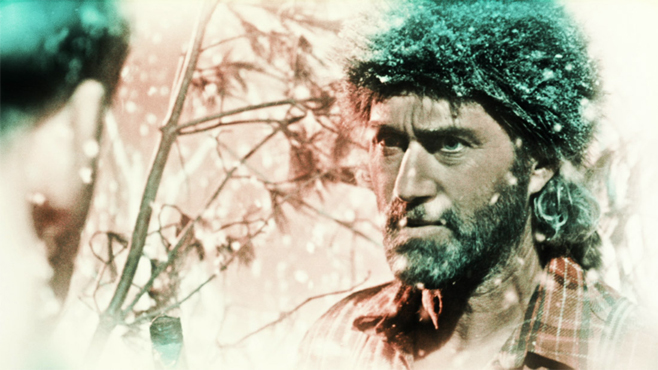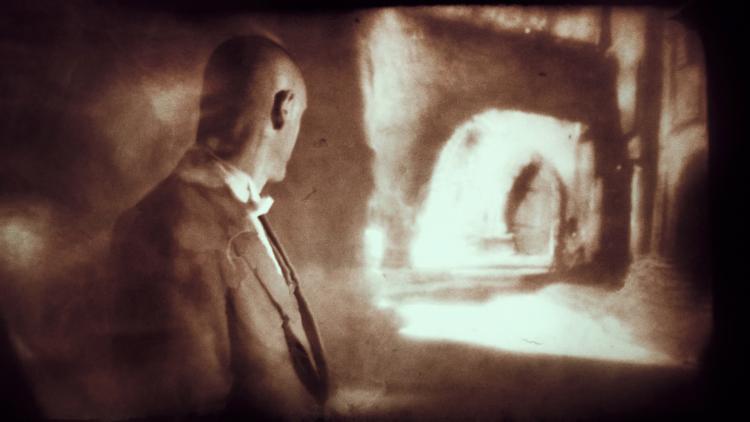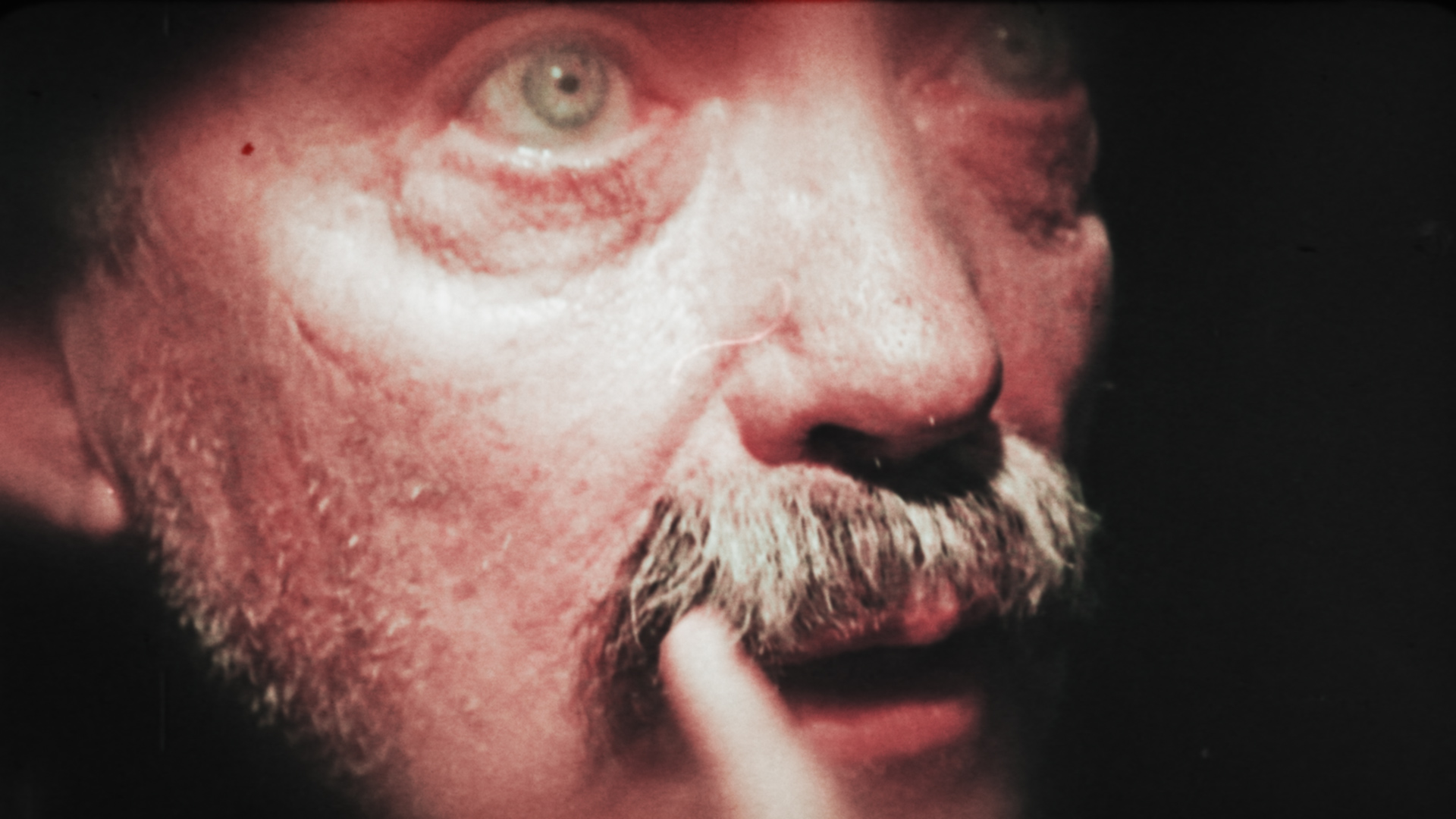
Dubbed in the press notes as the “ultimate epic phantasmagoria,” Guy Maddin and Evan Johnson’s The Forbidden Room is unlike any film you have seen or will see in this lifetime. Building intoxicating dreamscapes within intoxicating dreamscapes, the movie jaggedly oscillates between being soothing and dizzying, mystifying and accessible. Clearly an ode to lost cinema, Maddin and Johnson’s unhinged opus includes an assortment of these key items:
1. Baths
2. Flapjacks
3. Aswang
4. Janus
5. John Ashbery
During this year’s Sundance Film Festival, I sat down with Maddin and Johnson to have a fittingly sprawling conversation about everything under the sun. Topics range from their tight-knit collaborative process for the film to their hopes, dreams and delusions about marketing it to stains, shame and care homes. The film continues to play festivals, and is currently at the Berlinale.
Samuel Fragoso: So I walked out of this film and my first thought was, ‘Either I’m an idiot or you two are both geniuses.’
Guy Maddin: It’s possible that both are true.
[Laughter for fifteen seconds.]
Fragoso: Let’s start with collaboration.
Maddin: We were co-directors. Actually, we should both be called directors. Not co-director/co-director. Next time.

Fragoso: Why did you do that?
Maddin: Maybe just to keep some momentum out of my work. I’m not sure.
Evan Johnson: I think throughout the process of shooting, where you spent more talking to the actors.
Maddin: I actually did say, ‘Cut and action’ to the actors. But there are some many ways of being a directors. Let’s say you’re an editor and you get a bunch of found footage and you make a documentary out of it, you’re the director. So an editor is a filmmaker. The director is a filmmaker. The person that color times, edits, and oversees production. There are some many people who are filmmakers. But he [Johnson] and I worked together so closely at the screenwriting stage. Then in post he did all the color-timing effects. His brother the production designer helped. It’s so collaborative that ever getting all the credit [or] all the blame is ridiculous.
Fragoso: There are not a whole lot of co-directors making films. What was this process like in comparison to the individual work you two have done in the past?
Maddin: Well, it probably helps to break things down a little bit. I know the Quay brothers, but they’re animators. It’s easier to divide the work. There are things I have lots of experience at, and then there are things that I can’t do that he can.
Fragoso: You two complement each other.
Maddin: Yeah, I’m a little more analogue; he’s a little more digital. Together we got this thing which is seemingly analogue….
Johnson: You’re a little bit more country; I’m a little bit more rock’n’roll.
Maddin: Exactly. You’re chocolate, I’m peanut butter. But we just did it without thinking it. We had to get the picture made. And then we only signed the credits at the end really, when it became obvious that he had done every bit as much as any director has ever done to make a movie.
Fragoso: Where does this movie come from?
Maddin: It kind of started to small . . . . We were naive about how big it might have been, and then it just got out of hand, and became what it had to be.
[Johnson begins to smirk.]
Fragoso: Your facial expression says it all Evan.
Maddin: (Laughs.) No, we’re destroyed. We’re financially, emotionally and physically destroyed. And it started off as an Internet project, which was just going to be my attempt at trying to make some movie art that didn’t just get slid on a shelf after playing at a few theaters for a weekend. Something that will live out there and maybe reach a lot more people. We started working on the Internet interactive and then decided to make a feature at one point. We decided to make a feature structured along the lines of a Raymond Roussel fiction. The French eccentric writer who spent a lifetime writing plays, poems, novels and short stories all based on these narratives nested within narratives within narratives. And then, as you work your way out from the chewy center of these things, it’s really pleasing to find yourself not so lost after all. But it’s exhausting and overwhelming and beautiful and puzzling. You don’t even know why a guy would do that. They took a long time to write, with very little payoff and very little critical approval during his lifetime. We were also emboldened because John Ashbery wrote the monologue that starts and ends the movie, ‘How to Take a Bath.’ And he’s the guy who learned French so he could read Raymond Roussel.

Fragoso: Have you both seen The Grand Budapest Hotel?
Johnson: Yep.
Maddin: When I first heard of ‘The Grand Budapest,’ I was worried.
Johnson: When we first saw it we were worried and a little horrified, because it begins nested. Right off the bat.
Maddin: (Laughs.) And I thought holy shit, ‘That fucker! That fucker Wes Anderson!’ We had been working on this for years and this fucker who already has a fan-base of hundreds of millions of people—and a coffee table book that’s through the roof….
Fragoso: Ah, Matt Zoller Seitz. Great guy.
Maddin: Matt Zoller Seitz? Yeah, [he could] put his kids through school and college now with that book. That Wes Anderson book of his is a brilliant idea. He deserves every penny he earns from that. How no one noticed that gap. There’s all this material from Wes and no one had put it out in a book. It’s a great idea. I’m not jealous of Matt. I’m a jealous person, but I’m not jealous of Matt. Happy for him!
But I only said ‘fuck Wes Anderson’ because I was scared he made the movie that we just finished ruining our lives making. When I went to see it, obviously, we were sloppy and all over the god damn place and he’s so formally pure.
Fragoso: Your lives are ruined?
Johnson: No, no. Not at all. We’re fine.
Maddin: No, not at all. I’m just used to taking regular rests, and I had to work hard to make this movie. So my routine was destroyed.
Johnson: It was financially difficult.
Maddin: Yeah and we went into overtime making this thing, so the money ran out a long time ago. So we’re struggling financially, but we’ll be okay.
Fragoso: It’s good to know you two won’t be homeless.
Maddin: It’s a grand tradition of filmmakers to go broke. Douglas Sirk was a bean farmer halfway through his career for awhile.
Fragoso: So that’s your next move.
Johnson: We’re doing it.
Maddin: We are farming beans.
Fragoso: Seems like the natural next step for you two.
Maddin: The Forbidden Room, then bean farming.
Johnson: And then into the grave.
Maddin: I opened up a brand new grave in Winnipeg not too recently and will be moving in with what’s left.
Fragoso: What’s the rent like?
Johnson: You are a renter.
Maddin: (Laughs.) It’s already paid for. At my mother’s request I’m being buried on top of my mother. So it’s already paid for and I’m just moving in with Mom.

Fragoso: You mentioned the idea about making something interactive for the Internet—to reach a larger audience. How important is that a lot of people see your work?
Maddin: I don’t know about Evan, but we all have our own ways of creating delusions and anesthetic trickles that enable you to get through each day on this planet without having to face the fact that some scary void awaits us all. I get through somehow just telling myself that I’m making a little body of work that might survive me by a generation or something like that. And I hope to do so. It doesn’t mean the void will be any less of a void when it comes. But I don’t know, some people I love will hopefully survive me and maybe be proud of me every now and then. I hope to leave things that, if they didn’t make everyone rich and coke-headed, at least I leave some love and some pride behind after them. That’s all. That’s all I care about. I would be disappointed if it opened and closed in a theater and was completely forgotten. But if things open and close then sort of leave a little echo of once having been for awhile, then I’m happy. I’m not too greedy.
Johnson: When we were making this movie we got a little deluded that it was a really, really simple crowd-pleasing, box-office hit.
Maddin: There are little moments where it’s a crowd-pleaser. Five seconds here. Two seconds here.
Fragoso: The bathtub tutorial is dynamite.
Johnson: Yeah, it’s practical. You can learn things from it.
Maddin: We should have just made a feature of bath instructionals. We got some outtakes of the bathtub sequences we could probably use.
Fragoso: Do you consider Ashbery’s character the narrator?
Maddin: I guess he’s a human framing device, among other things. And he’s an instructor.
Johnson: We found that there were things that he was saying that gave you a little bit of an instruction on how to watch the movie.
Maddin: Yes, ‘work carefully toward the genitals in ever-widening circles.’ Which sort of reminded me of the structure of the film.
Johnson: (Laughs.) Subtle hints about the kinds of things you do while watching a movie. Immersion. Some kind of farting in the bath. I don’t know. It just felt right.

Fragoso: I’m curious as to whether you two genuinely believe The Forbidden Room, in any world, could be considered a ‘crowd-pleasing’ affair.
Johnson: (Laughs.) It got rejected from festival competition, and someone consoled us by saying that ‘if it was in competition it wouldn’t have been fair to the other movies.’
Maddin: (Laughs.) Oh that’s right. That’s when our sales agent tried to position it in Cannes or something. She said we should position it out of competition. And I said, ‘Why, I like competition. I don’t even mind risking the loss. I just want to get in there and have a chance.’ And she said, ‘It just wouldn’t be fair to the other movies.’
Johnson: It made us smug for a few seconds until we realized it was the most ridiculous thing anybody had ever said. She was very nice.
Maddin: She was letting us down easy.
Johnson: But it did feel like we were giving a lot to the audience. To the kind of audience that we might be. A lot of color. A lot of jokes. There are songs. There’s a plot.
Maddin: Plot! There’s more plot than usual.
Johnson: Maybe we didn’t quite realize that most audiences need all that stuff organized in a very specific way in order to be brought along.
Fragoso: Not need, but….are accustomed to.
Johnson: That’s right, ‘accustomed.’ Maybe there are customs that annoy us as viewers.
Maddin: Sure, we don’t like them. Listening to Rick Alverson the other night, he just said, ‘I hate metaphors. I hate these movie tropes that make everyone feel secure about the experience they just had.’
Fragoso: Do you hate metaphors?
Maddin: You know what, Alverson and I come at movies from 180-degree different angles, but we end up doing the same thing in a way. I think we end up repurposing a metaphor. As much as he hates them, he ended up dragging them into his movie, angrily, messing with them, almost forcing them on viewers at times. And then you end up with an experience that’s just filled with antipathy for conventional moviemaking. Even if we approach with nothing but love in our hearts, we kinda ended up making something that’s just as willfully self-marginalizing as he did. But we’re all pretty proud of what we’ve done and feel pretty good about that.

Fragoso: I sensed that.
Maddin: Well we’re not that proud.
Johnson: Yeah, there’s some shame.
Maddin: Tons of shame.
Fragoso: What’s the shame?
Johnson: Well, there’s a lot there…
Maddin: There’s that sperm-shame. That shame of when you just ejaculated.
Johnson: Like you made a stain. We made a stain on the screen and we’re proud of the stain.
Maddin: From the Latin language ‘jacio,’ to throw out. Yeah we’ve got sperm-shame. It’s a feeling that we all have from our first times alone with sperm-shame. You feel like you’re the only one that made that stain. There’s a bit of shame.
Fragoso: Yeah, you’re wondering if what you’re doing is right.
Johnson: We were still wondering if this was right I guess.
Maddin: I remember someone telling me at twenty when I confessed to having masturbated recently and the guy said, ‘You still masturbate? I grew out of that a long time ago.’ I visit my mother in a care home now….
Fragoso: No, please, don’t….
Maddin: …she’s still alive and trust me, you get uninhibited with dementia. They’re all still masturbating. Sometimes during lunch!
Johnson: They do it in the games room.
Maddin: ‘My shuffle board is all off! I just hit a gunky spot on the board! More powdered wax please!’



